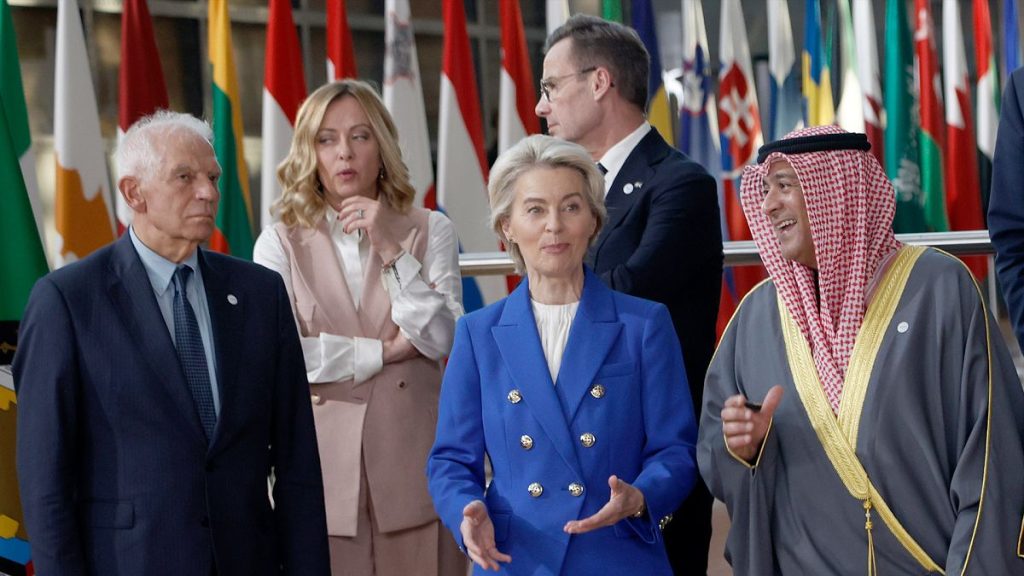The EU’s foreign policy chief Josep Borrell praised the efforts of Gulf countries in addressing the conflict in the Middle East and emphasized the importance of humanitarian aid in Gaza. Representatives from the EU and the Gulf countries convened in Brussels for their inaugural joint summit to enhance their relations. Borrell commended the Gulf countries for their contributions to regional security and their attempts to end the cycle of violence in the Middle East. He highlighted the joint efforts of the Gulf partners in promoting peace, particularly the global partnership for the implementation of the two-state solution, which is seen as the only path to lasting peace. The leaders agreed on the urgent need for an immediate and comprehensive ceasefire, the release of all hostages, the exchange of Palestinian prisoners, and unhindered access to humanitarian aid in Gaza for all Palestinians in need. The EU and the Gulf states are united in making these priorities a common focus.
The joint communiqué issued by the leaders also addressed the ongoing conflict in Ukraine, emphasizing the importance of achieving a just and lasting peace in accordance with the principles of the United Nations Charter. The meeting between European Commission President Ursula von der Leyen and Crown Prince Mohammed bin Salman of Saudi Arabia, who has been associated with the murder of journalist Jamal Khashoggi, provoked controversy. Despite this, the EU and the Gulf states have committed to holding regular meetings every two years to maintain their relationship, with the next meeting scheduled to take place in Saudi Arabia in 2026.
The summit in Brussels marked a significant step towards strengthening relations between the EU and the Gulf countries, focusing on key issues such as regional security, peace in the Middle East, and humanitarian aid in Gaza. Gulf countries were acknowledged as important partners in addressing common challenges and working towards peace and stability in the region. Borrell’s positive comments on the Gulf countries’ efforts and the joint initiatives for peace underscored the importance of cooperation and dialogue in resolving conflicts. The communiqué’s call for a ceasefire, the release of hostages, the exchange of prisoners, and access to humanitarian aid reflects a shared commitment to addressing humanitarian crises and promoting peace in conflict-affected areas such as Gaza.
The meeting highlighted the shared priorities and common goals of the EU and the Gulf states in addressing regional challenges, including the conflicts in the Middle East and Ukraine. The commitment to regular meetings every two years demonstrates a mutual desire to maintain a constructive dialogue and collaboration on key issues of mutual interest. Despite the controversy surrounding individual meetings, the overall focus on cooperation, peace, and humanitarian assistance underscores the importance of working together to address complex challenges. The joint efforts to promote peace, support humanitarian aid, and strengthen regional security reflect a commitment to peaceful resolution of conflicts and a shared vision for a stable and prosperous future for the region.
Overall, the summit in Brussels served as a platform for the EU and the Gulf countries to engage in a productive dialogue on regional security, peacebuilding, and humanitarian assistance. The joint initiatives and commitments made by the leaders show a shared dedication to resolving conflicts, supporting peace efforts, and addressing humanitarian needs. The emphasis on dialogue, cooperation, and mutual understanding underscores the significance of international partnerships in addressing complex challenges and promoting stability and prosperity in the region. The regular meetings planned for the future demonstrate a long-term commitment to maintaining strong relations and addressing common challenges together. The joint communiqué reflects a unified approach to addressing key issues and working towards a peaceful and prosperous future for the region.


